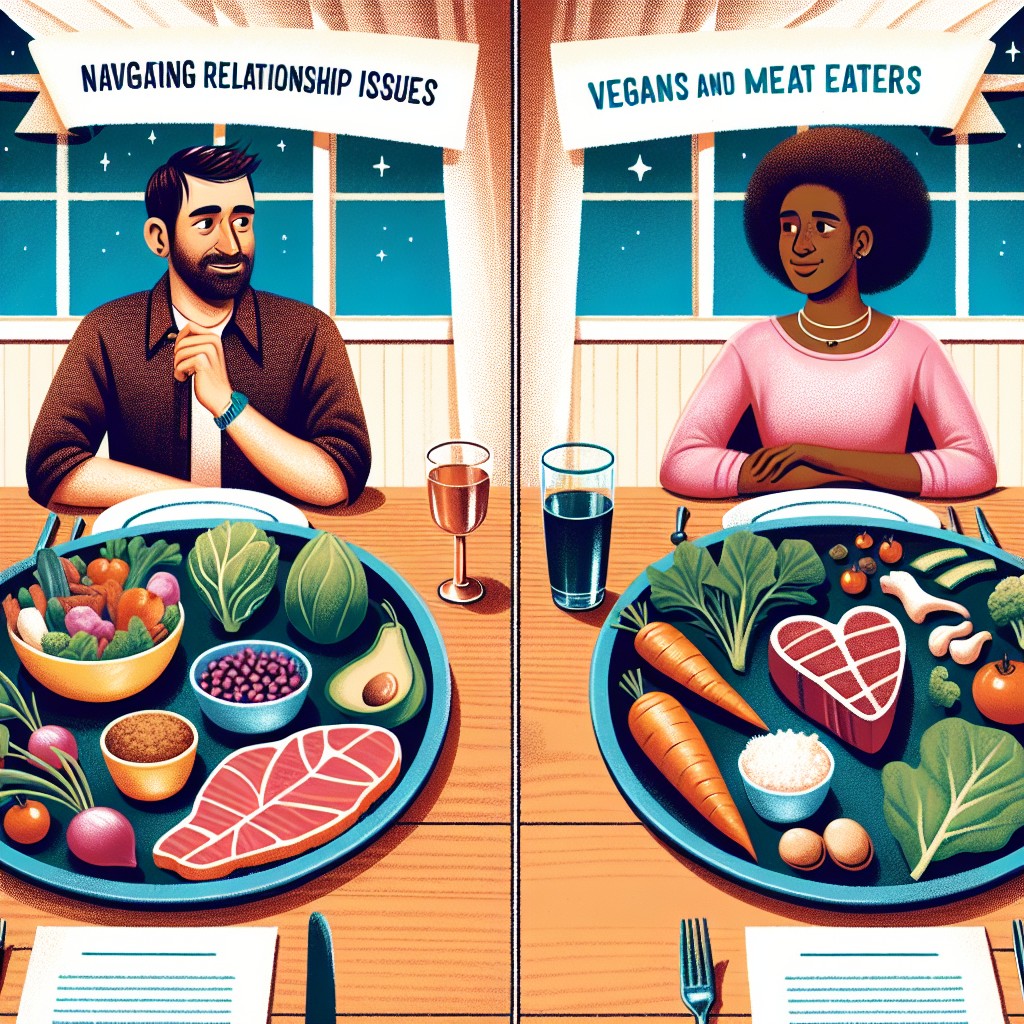A vegan and a meat eater walk into a restaurant. Sounds like the beginning of a joke, right? But for many couples, this scenario can actually lead to some serious relationship issues. When two people with different dietary choices come together, finding common ground can be a challenge. From meal planning to socializing with friends and family, navigating these differences can sometimes feel like walking on eggshells.
As the number of people adopting plant-based diets continues to rise, it's not uncommon for vegans and meat eaters to find themselves in relationships with opposing dietary preferences. While it may seem like a trivial matter to some, food choices can be deeply rooted in personal beliefs, values, and health concerns. Therefore, it's important for both parties to approach this issue with empathy and respect.
Communication is key in any relationship, and this holds true when it comes to the topic of food choices as well. It's essential for both vegans and meat eaters to express their needs and concerns openly and honestly. Each person should be willing to listen and understand the other's perspective without judgment. By fostering open dialogue, couples can find common ground and collaborate on meal options that cater to both dietary preferences.
Meal planning can be a major challenge for couples with differing dietary choices. However, it doesn't have to be a source of conflict. With a little creativity and compromise, couples can find a balance that satisfies both vegans and meat eaters. One option is to plan meals that have a vegan base, but allow for the addition of meat as a side or topping. For example, a vegan stir-fry can be served with tofu or tempeh for the vegan partner, and with chicken or beef for the meat-eating partner. This way, both individuals can enjoy a meal together without compromising their values or preferences.
Similarly, couples can experiment with plant-based substitutes for meat products. There are now countless vegan options available in supermarkets and restaurants, from vegan burgers made from soy or lentils to dairy-free cheeses and plant-based milk alternatives. By incorporating these alternatives into their meals, couples can bridge the gap between their dietary choices and enjoy a shared dining experience.
Social situations can also pose challenges for couples with different dietary preferences. Attending family gatherings or going out with friends may require some pre-planning and open communication. It's important for both partners to discuss their concerns and expectations ahead of time. For example, if a vegan is attending a family barbecue, they can bring their own vegan patties to grill, while the meat-eating partner can ensure that there are vegetarian side dishes available. By finding solutions that respect each other's choices, couples can navigate social situations without causing unnecessary tension or discomfort.
In some cases, educated compromise might be required to maintain harmony in the relationship. Couples can establish rules or guidelines that both parties are comfortable with. For instance, they may agree to have separate pots and pans for cooking vegan and non-vegan meals to avoid cross-contamination, or to only dine at restaurants that offer vegan options. By finding solutions that work for both individuals, couples can prevent disagreements and foster a supportive and understanding environment.
It's worth noting that while dietary choices can be a source of tension, they can also be an opportunity for growth and learning. By engaging in conversations and participating in each other's food experiences, couples can broaden their horizons and develop a deeper understanding of their partner's values and beliefs. A vegan partner can introduce the health and environmental benefits of a plant-based lifestyle to their meat-eating counterpart, while the meat-eater can share their perspective on the importance of animal proteins. These conversations can be enlightening and create room for personal growth within the relationship.
It's important to acknowledge that some relationships may struggle to find common ground when it comes to dietary choices. For some individuals, food choices are deeply ingrained in their identity, and compromising on this aspect may not be feasible. In such cases, couples may need to seek professional help or explore alternative solutions to navigate these issues.
In conclusion, relationships between vegans and meat eaters can be complicated, but with open communication, creativity, and compromise, it is possible to navigate the challenges. Both partners should approach the topic with empathy and respect, and be willing to listen and understand each other's perspectives. By finding common ground in meal planning, social situations, and compromise, couples can foster a supportive and understanding environment where both individuals feel respected and valued. Remember, love and respect should always triumph over dietary choices.

Published on September 10, 2023
Vegans and Meat Eaters: Navigating Relationship Issues
Share This Article
More Articles You Might Like
Discover More Content
Explore our collection of articles across various topics and categories. From cutting-edge technology insights to wellness wisdom, we curate the best stories to expand your horizons.
Article ID: 164